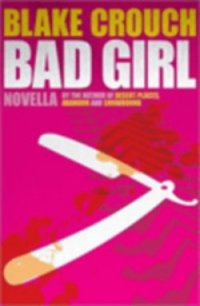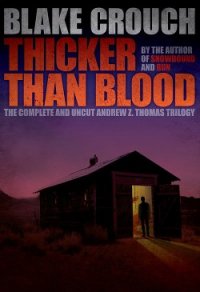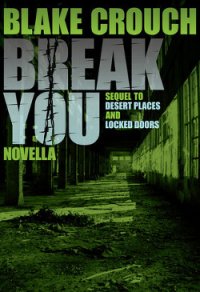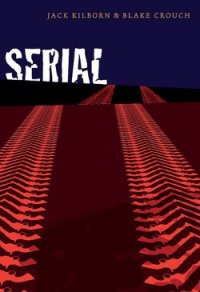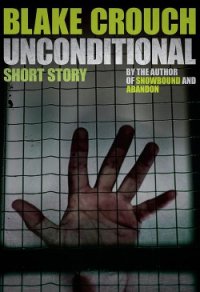Locked Doors - Crouch Blake (читаем книги онлайн .TXT) 📗
Horace smiled but fear tempered the excitement—he’d found Luther Kite.
And it suddenly occurred to him.
What if Andrew had never left this island?
What if Andrew Thomas was dead along with the blond who’d been with him?
Horace sat down in the shadow of the House of Kite. For twenty minutes he watched the moon rise into the sky, mulling over whether he should do the safe thing—leave immediately and contact the police—or the ballsy thing that might make him famous.
By the time Luther reemerged from the door beneath the staircase, Horace had made his decision. From the window he watched Luther trudge upstairs. A moment later, the last light on the second floor went out. Now, aside from the dwindling firelight in the living room hearth, the house stood still and dark.
Horace came to his feet, moved quietly toward the stoop, and climbed four steps up to the door, his legs gone weak and rubbery. Regardless, he reached for the doorknob. It turned but the heavy door would not open. He leaned his weight into it, gave the wood a bump with his shoulder. It didn’t budge.
Horace walked back down into the yard and jogged through the beach grass around the side of the house, the smell of woodsmoke strong at the chimney’s base. There were no windows on the north end—just a wall of granite pushing into the sky.
The moon was high enough to set the backyard alight with its sickly-gleaming radiance. The Pamlico Sound stretched out before him, a black chasm, hugely silent and smooth as volcanic glass.
Horace proceeded toward a stone porch with a jaw-dropping view of the sound, climbed several steps to the back door, and looked through screen and glass into a kitchen.
He pulled on the screen door. It opened. He tried the next door knob and though it wouldn’t turn, the inner door appeared not to have been soundly closed.
He thrust his shoulder against the door.
It jarred open.
Horace stepped into the kitchen and carefully shut the door behind him.
There didn’t appear to be a single light in operation in the entire house.
Nor was there any sound.
The kitchen reeked of raw fish and vinegar.
Horace inched forward. The splitting linoleum creaked.
Three more steps and he reached the intersection of two hallways, one leading to the front door, the other running the whole of the first floor into a room whose only light source emanated from the weak brown glow of those dying embers he’d glimpsed from outside.
Horace crept across a dusty hardwood floor, through the corridor that led past the staircase into the foyer.
Something popped.
Horace flinched.
It was just the fire, feeding off pockets of sap in the logs.
He entered the living room and stood before the hearth, basking his hands in the rising heat. Shadows flickered in delicate motion on the walls and ceiling. Flames hissed softly. Even through the woodsmoke he could smell the age and neglect of this ancient house.
Horace turned and let the fire warm his back, staring through the long room at the staircase. The itch of curiosity dragged him toward the foyer, away from the heat and light and sound.
He found himself standing in the darkness under the stairs, facing a locked door, the top of which came only to his eyes. From his pocket he took the flashlight. Its beam revealed a deadbolt in the door.
I saw Luther take something off this wall.
Horace shined the flashlight around the perimeter of the door. To the right of the doorframe, a shiny key hung from a nail.
He jammed it into the deadbolt.
The door swung inward and a cold dank draft swept up out of the darkness and enveloped him.
He smelled stone and water, mold and earth, as though he stood at the entrance to a cave. Though he’d yet to cut the darkness with his flashlight, there was no question in his mind that this door led to someplace underneath the House of Kite.
And the hair on his arms stood erect and some primal siren sounded in his brain, but mistaking terror for adrenaline, he walked down into the darkness because he’d never felt more alive.
54
HORACE kept the beam of the flashlight trained on the rickety steps. They creaked as though God Himself were standing on them—twenty-two in all—and it grew colder the farther down he went so that his breath was pluming again by the time he reached the bottom, a dusty vapor in the lightbeam.
At last Horace stood on a dirt floor.
He shined the flashlight back up the staircase. The door at the top felt miles away.
The basement lay in pure silence and blackness. Horace imagined sitting at a table in the Ocracoke Coffee Company the following morning, near a window with the early sun streaming in. He would write this scene over coffee. It would be amazing. It would be safe.
Horace swiped the beam in a slow circle to gain his bearings.
What he saw unnerved him—doorways into nothing, stone passageways, shoddy wiring snaking up the walls. He shivered, stepped back from the steps, and shined the flashlight down the widest passageway, one that ran behind the staircase into seemingly infinite darkness.
It occurred to him that a person would have to be mad to enter that tunnel, and for a moment, he strongly considered heading back up the steps, through the kitchen, into the moonlit yard. The comfort of his bed at the Harper Castle B&B seemed more enticing than ever but he steeled himself, gripped the flashlight, and proceeded into the passageway.
He progressed slowly, letting the beam graze every surface.
The corridor appeared to narrow the deeper he went.
Horace passed a doorway, shined a light through it. In the brief illumination, he glimpsed a big oak chair in the throes of construction, dripping with wires and leather restraints.
He lost his breath, leaned against the wall to get it back.
When the sound of his own panting subsided, he listened.
Water dripped somewhere in the distance, beyond the ellipse of light.
He heard something move behind him, spun around with the flashlight.
There was nothing there but the sound repeated.
When the beam hit the floor he saw the fat rat sitting on its haunches staring at him, eyes glowing like luminescent beads.
It scampered back toward the stairs and Horace moved on in the opposite direction, the passageway now turning and branching and turning again, passing through alcoves and various rooms—one with a low ceiling, filled with empty wine racks, another with the burned and splintered remains of a bed frame. There lingered a foreboding, a dread attending these rooms and tunnels. Horace could feel it. Awful things had happened here.
He approached yet another corner, disorientation setting in. The basement seemed to extend beyond the boundaries of the house and he doubted whether he could readily find his way back to the stairs.
At the corner he stopped, shined his flashlight through the next fifteen feet of passageway.
An icy drop of water splashed in his hair.
He glanced up.
Another landed on his nose.
Horace wiped his face, moved on.
A moment later he arrived at a fork in the passageway.
He stopped, looked back in the direction he’d come, trying to recall the turns he’d taken, resolved now to find his way back to the stairs and leave this place.
He heard something, turned, now facing the two tunnels, sound coming from the one on the left, and not the scratchy footsteps of a rat or dripping water.
As Horace illuminated the tunnel, he wondered if the beam had weakened. It seemed softer, less focused.
He ventured in.
This corridor ran straight and narrow, the sound louder now, a metallic clink-clink-clink.
